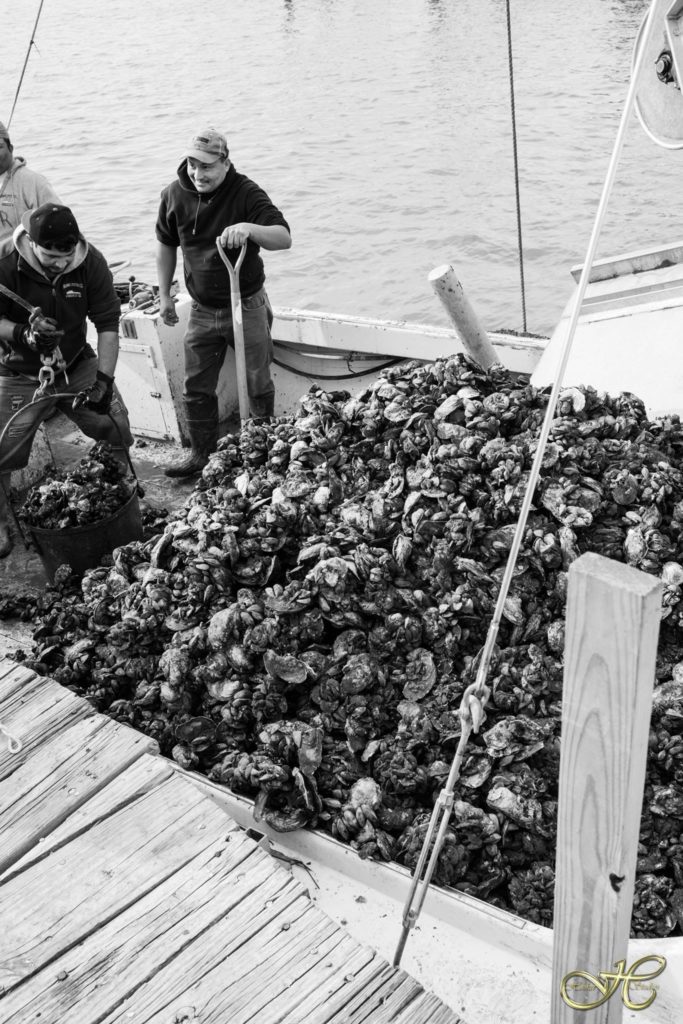Cover photo by Bobby Hooker, Hooker Studio
Town of Colonial Beach, Virginia (CBVA) is located on the shoreline of the Potomac River, which low-water mark serves as the Virginia-Maryland border in most places. So when visitors are on CBVA’s sandy beaches, they are in Virginia; but once they step into the river, they have entered Maryland. Colonial Beach’s unique location made it the epicenter of the century-long Potomac River Oyster Wars, a significant aspect of the Town’s history, that lasted from 1865 to 1959.
Photo by Bobby Hooker, Hooker Studio
Virginia’s Oyster History
The Chesapeake region in Virginia is known for oysters–the “Oyster Capital of the East Coast†according to some. In fact, in the 19th Century, oysters were as hot a commodity as gold and crucial to the area’s economy. During a meeting at Mount Vernon, George Washington and representatives from Maryland and Virginia finalized the Maryland–Virginia Compact of 1785, which determined, in part, that “all laws and regulations†regarding fishing and boating on the Potomac River “shall be made with the mutual consent and approbation of both states.” Instead, the local waterways’ valuable oysters created competition between the two states with increasing conflict that culminated in violence and the death of a Virginia farmer.
“Wild days of the southern Potomac Riverâ€Â
In his book The Oyster Wars of Chesapeake Bay, John Wennersten describes Berkeley Muse as “a shrewd businessman†and a respected and well-liked local farmer who outgrew his “hell-raising days†after marrying and fathering three children. The story goes that in the early hours of April 8, 1959, Muse was cajoled into helping two old friends, Harvey King and John Griffith, dredge Maryland oysters from the Potomac, despite the risk of getting caught by police. Unbeknowgst to the men, “The Maryland Oyster Police had two re-purposed PT boats – the McKeldin and the Honga River – patrolling near the mouth of Monroe Bay at the state line that night, after they heard reports of earlier oyster poaching.â€Â
As the fog began to lift in the early hours, police began pursuing the poachers, firing warning shots as the boats raced toward Monroe Bay. “The officers… continued to fire, and as King swerved the boat, Berkely Muse yelled, ‘Oh! I’ve been hit!’ and collapsed on the culling board. Another bullet struck King in the leg, and as the dredger struggled to get the motor boat to Reno Pier, Griffith held Muse’s unconscious body. Griffith’s hand was covered in blood and he could see that Muse was shot in the chest. The boat ran right up on the beach and Griffith yelled for the rescue squad. Before the ambulance arrived, Berkeley Muse lay dead in the boat.â€Â
Maryland Oyster Police fired 27 rounds that night, two of which injured the men and at least one hitting a nearby building, outraging local residents as it was not the first time police bullets had landed on shore. According to an article in The Free-Lance Star, two years earlier King had been chased, fired upon, and captured by the marine police, but later acquitted.
The incident effectively ended the Potomac River Oyster Wars and led to the creation of the Potomac River Fisheries Commission, located in Town of Colonial Beach.
Potomac River Oyster Wars Historical Highway Marker
Recently, Town of Colonial Beach was approved by the Board of the Virginia Department of Historic Resources for a historical highway marker documenting the Potomac River Oyster Wars and the death of Berkeley Muse. Efforts to secure the historic marker were led by Colonial Beach Parks and Recreation Director Robert “Bobby†Duke and Town of Colonial Beach Councilwoman Dr. Caryn Self Sullivan. A lifelong Colonial Beach resident, Duke conceived of the idea for the marker to promote heritage tourism in CBVA, enhance Town parks and green spaces, and for a more personal reason: Berkeley Muse was Bobby’s uncle.
“While most ‘natives’ know about the Oyster Wars, newer residents and visitors may not, despite books and articles written about it,†explains Duke. “I’ve been working on securing this designation for about 18 months, so I am pretty excited to see it come to be. My Aunt Alice, who just passed away, said it best. ‘April 8, 1959 was a day no one who was there would forget.’â€Â
Read the full press release on the Town of Colonial Beach government website.Â
The folksy “Ballad of Berkeley Muse” by Calico Jack and Janie Meneely can be heard on Spotify or Amazon.

